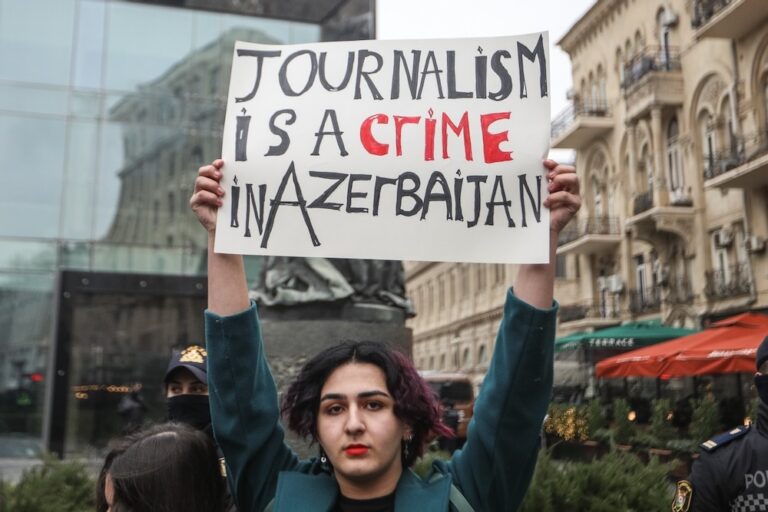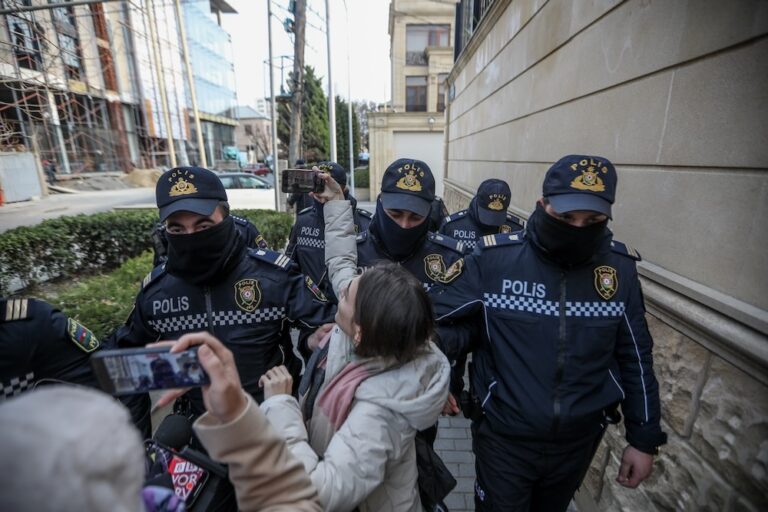Khadija Ismayilova was a pioneer in exposing large-scale corruption connected to the ruling family in Azerbaijan. The Panama Papers confirm what had previously been revealed by Ismayilova -- that the family of Azerbaijani President Ilham Aliyev is making frequent use of offshore companies to hide its wealth.
This statement was originally published by the Institute for Reporters’ Freedom and Safety (IRFS) on 12 April 2016.
The revelations contained in the Panama Papers add further momentum to calls for the immediate and unconditional release of Azerbaijani press freedom hero, journalist Khadija Ismayilova, said the Institute for Reporters’ Freedom and Safety (IRFS) today.
Khadija Ismayilova was a pioneer in exposing large-scale corruption connected to the ruling family in Azerbaijan. The Panama Papers confirm what had previously been revealed by Ismayilova— that the family of Azerbaijani President Ilham Aliyev is making frequent use of offshore companies to hide its wealth and its ownership of shares in Azerbaijan’s most lucrative businesses.
It is precisely for her groundbreaking reporting that Ismayilova has been languishing behind bars since December 2014. In September 2015, she was sentenced to prison for seven and a half years on charges of tax evasion and illegal business activities.
Prior to her arrest in December 2014, Khadija Ismayilova, together with journalists from Organized Crime and Corruption Reporting Project (OCCRP) and the International Consortium of Investigative Journalists (ICIJ), exposed the large-scale illegal enrichment schemes employed by Azerbaijan’s ruling family, namely the use of offshore companies registered in Panama.
Numerous investigations by Ismayilova from 2010 to 2014 showed that the family members of President Ilham Aliyev have acquired billions of dollars through abuse of power. The investigations have revealed that Azerbaijan’s ruling family has illegally gained control over virtually all of the most profitable sectors of the economy, including the mining and processing of precious metals, extraction and sale of oil and gas, banking and insurance, telecommunications, transport, construction and hospitality.
It has been alleged that, in order to prevent Ismayilova’s investigative work, the authorities deployed the special services of Azerbaijan to illegally film and disseminate footage of the journalist’s private life in an attempt to silence her. When Ismayilova refused to give in to this appalling blackmail attempt, and continued her principled investigative work, the Azerbaijani authorities amended the country’s legislation in 2012. Strongly criticized by pro-transparency groups, the changes curtail public access to information about the ownership of commercial entities, the amount of their charter capital, ownership structure, and other similar data. These amendments, known as the “corporate secrecy amendments,” breach the principles of transparency and public control over the activity of legal entities.
Although these amendments created significant barriers to her investigative work, Khadija Ismayilova continued her fight for justice. In the face of her brave determination, the Azerbaijani authorities resorted to bogus criminal charges against Ismayilova: tax evasion, illegal entrepreneurship and abuse of power. The journalist was accused of carrying out illegal activities in Azerbaijan linked to tax evasion in her capacity as the head of the Baku Bureau of Radio Liberty. Despite the fact that neither the investigation nor the demonstrably politicized trial revealed any evidence of her guilt, the journalist was sentenced to a lengthy prison term.
In addition to Ismayilova, prominent human rights activists Leyla and Arif Yunus, Intigam Aliyev, Rasul Jafarov and Anar Mammadli were also arrested and sentenced on similarly politically motivated charges of tax evasion, illegal business activities and abuse of official powers. All of them have been eventually released. “Historically, every batch of prisoners’ release has coincided with an important political development”, comments Emin Huseynov. “For example, just ahead of President Aliyev visit to Washington, 17 political prisoners were released in March. The regime seems to be carefully calibrating the release of political prisoners in batches in return for concessions from the West, especially from the United States”, Huseynov noted.
The Panama Papers show that the previous investigations by Ismayilova are the only the tip of the iceberg. The extent of the ruling family members’ involvement in corruption schemes is in fact much greater. The Minister of Taxes of Azerbaijan has been personally involved in the process of opening offshore companies in Panama for the members of the President’s family. The government official who is supposed to fight against tax and economic crimes has helped the President and his family members to illegally enrich themselves.
“The Panama Papers and investigations by Khadija not only link Azerbaijan’s ruling family to huge amounts of treasure held in secret offshore accounts but also raise questions about our ‘ratification’ of the United Nations Convention Against Corruption (UNCAC) as well as implementation of the UN’s Global Counter-Terrorism Strategy”, said Emin Huseynov.
In response to international criticism, the Azerbaijani government is claiming that the country is committed to fighting corruption, as a member of Open Government Partnership (OGP) and the Extractive Industries Transparency Initiative. Indeed, Azerbaijan is a member of the OGP – a multilateral initiative that promotes open government by securing commitments from governments to promote transparency, empower citizens and fight corruption. However, the mission of the OGP couldn’t be further from the reality on the ground in Azerbaijan.
“The OGP member states are obliged to work closely with civil society to pursue reforms”, comments Emin Huseynov. “Paralyzed by government repressions, independent civil society institutions have been prevented from fighting against corruption and the lack of government accountability. By arresting Khadija Ismayilova — the country’s leading investigative journalist and anti-corruption activist — the authorities have sent a clear warning to anyone who seeks to reveal the corruption of the ruling elite. This, in turn, leads to high levels of self-censorship in society”, Huseynov stressed.
The ruling elite is abusing its power to access the country’s mineral wealth for personal enrichment. While the government doggedly prosecutes its most ardent critics on the pretext of combating tax evasion, none of the representatives of the current executive, legislative or judicial authorities of Azerbaijan (including their close relatives) has ever published a declaration of income in the entire 23 years of rule of the Aliyev family. This contravenes the law “On declaration of income”, effective since 2005, which states that all officials and members of their families are required to publish income statements.
In 2013, Khadija Ismayilova personally appealed to the Central Election Commission (CEC) of Azerbaijan, requesting the financial declaration of presidential candidate Ilham Aliyev. However, she was refused. According to the current Electoral Code, every person participating in municipal, parliamentary and presidential elections must publish and provide the CEC with a declaration of income. Despite this provision, the Azerbaijani public has never seen the pre-election declarations of income of members of the ruling Yeni Azerbaijan Party, concludes Huseynov.
The persecution of critics for political reasons has become routine. At a time when the repressive regime of Azerbaijan continues to hold Ismayilova in custody, the international community is recognizing her outstanding achievements. Last week Khadija Ismayilova was awarded the UNESCO/Guillermo Cano World Press Freedom Prize for her contribution to the advancement of the freedom of speech.
IRFS considers new evidence of corruption in the Azerbaijan’s ruling family exposed by Panama Papers as yet another reminder of the true reason behind Khadija Ismayilova’s imprisonment. To this end, IRFS calls on the international community to demand the authorities to release journalist Ismayilova immediately and unconditionally, and in the event of their refusal, to apply severe international sanctions against Azerbaijanis named in Panama Papers.
IRFS also calls on the international community to exert pressure on the authorities of Azerbaijan and to urge them to fulfill their international obligations in the field of fundamental human rights and in the areas of transparency and accountability.
While Britain, France, Australia and Mexico have vowed to investigate possible tax evasion in the light of the Panama Papers, no action has been taken by the Azerbaijani authorities, and nor has there been any reaction from the rubber-stamp parliament.
Until the government implements serious reforms, international financial institutions should flatly refuse to support any institutional, financial and economic initiative of the Azerbaijani government. Without reform, the allocated funds will be used for the exclusive benefit of high-ranking and corrupt officials. For the people of Azerbaijan, this will bring nothing but burdensome debts.
IRFS also calls on the Azerbaijani authorities to release Khadija Ismayilova and all other imprisoned critics, and to implement legal reforms to allow the independent media and other civil society institutions participate in the struggle to increase transparency and combat corruption.


